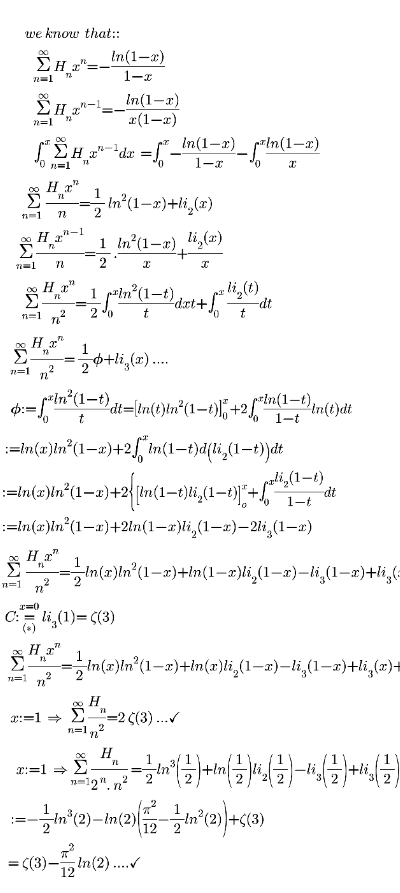
|
|

|
All Questions Topic List |
IntegrationQuestion and Answers: Page 75 |
Question Number 143230 Answers: 2 Comments: 0
|
| Σ_(n=1) ^∞ (x^(3n+1) /(3n+1))=?
|
|
Question Number 143219 Answers: 0 Comments: 1
|

|
Question Number 143210 Answers: 1 Comments: 0
|
| ∫_0 ^1 ((7^(x+1) +3^(x+1) )/(x+1))dx
|
|
Question Number 143192 Answers: 0 Comments: 0
|

|
Question Number 143190 Answers: 1 Comments: 2
|
| ∫_R (e^(its) /(s+3))ds
|
|
Question Number 143178 Answers: 0 Comments: 2
|
| ∫_1 ^∞ ((x2^x +7)/(3^x +lnx+1))dx
|
|
Question Number 143163 Answers: 0 Comments: 0
|
| ∫_(1/x) ^x^2 (dt/( (√(1+t^3 )))) =?
|
|
Question Number 143142 Answers: 1 Comments: 0
|
| ∫((x^2 −1)/(x^2 +1))∙(1/( (√(1+x^4 ))))dx
|
|
Question Number 143098 Answers: 1 Comments: 0
|
|
.....Prove....
Σ_(n=1) ^∞ ((1/(sinh(πn))))^2 =(1/6) −(1/(2π)) ...
......
|
|
Question Number 143094 Answers: 1 Comments: 0
|

|
Question Number 143087 Answers: 2 Comments: 0
|

|
Question Number 143083 Answers: 1 Comments: 0
|
| calculate Ψ(a,b)=∫_0 ^∞ (e^(−ax^2 ) /((x^2 +b^2 )^2 ))dx
with a>0 and b>0
|
|
Question Number 143082 Answers: 2 Comments: 0
|
| calculate f(a,b)=∫_0 ^∞ (e^(−ax^2 ) /(x^2 +b^2 ))dx
with a>0 and b>0
|
|
Question Number 143081 Answers: 2 Comments: 0
|
| calculate ∫_0 ^∞ xe^(−x^2 ) arctanx dx
|
|
Question Number 143080 Answers: 2 Comments: 0
|
| calculate ∫_0 ^∞ ((arctan(x^2 ))/(1+x^2 ))dx
|
|
Question Number 143071 Answers: 2 Comments: 0
|
| ∫_0 ^(π/4) ((8dx)/(tgx+1))
|
|
Question Number 143051 Answers: 1 Comments: 0
|
| _(∗∗∗∗∗) :: Lobachevsky Integral ::_(∗∗∗∗∗)
𝛗:=∫_0 ^( ∞) ((sin^2 ( tan(x)))/x^( 2) )dx=^? (π/2)
..........
|
|
Question Number 142990 Answers: 2 Comments: 0
|
| find ∫_0 ^∞ (e^(−x^2 ) /((3+x^2 )^2 ))dx
|
|
Question Number 142989 Answers: 2 Comments: 0
|
| calculate ∫_0 ^∞ (e^(−3x^2 ) /(1+x^2 ))dx
|
|
Question Number 142983 Answers: 0 Comments: 0
|

|
Question Number 142917 Answers: 1 Comments: 0
|
| ∫(sin^7 (x))dx
|
|
Question Number 142910 Answers: 2 Comments: 0
|

|
Question Number 142900 Answers: 0 Comments: 3
|

|
Question Number 142893 Answers: 1 Comments: 0
|
|
.....mathematical .....analysis......
f ∈ C [0,1] and ∫_0 ^( 1) x^n f(x)dx=(1/(n+2)) , n∈N
prove f(x):=x .....
|
|
Question Number 142875 Answers: 1 Comments: 0
|
| Prove that ζ(s)=Π_(prime) (1/(1−p^(−s) ))
|
|
Question Number 142805 Answers: 0 Comments: 0
|

|
Pg 70
Pg 71
Pg 72
Pg 73
Pg 74
Pg 75
Pg 76
Pg 77
Pg 78
Pg 79
|
Terms of Service |
Privacy Policy |
Contact: info@tinkutara.com |
















